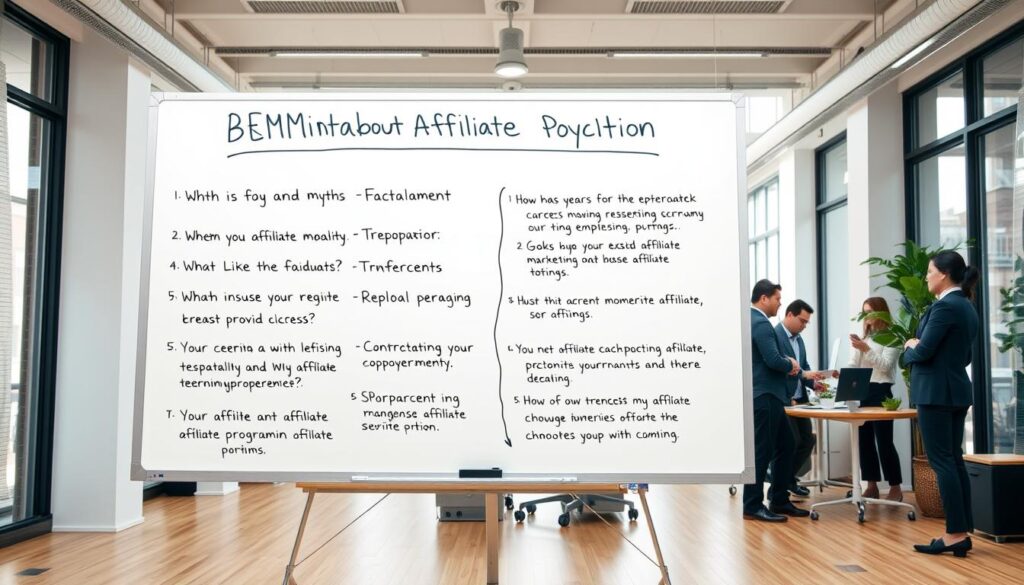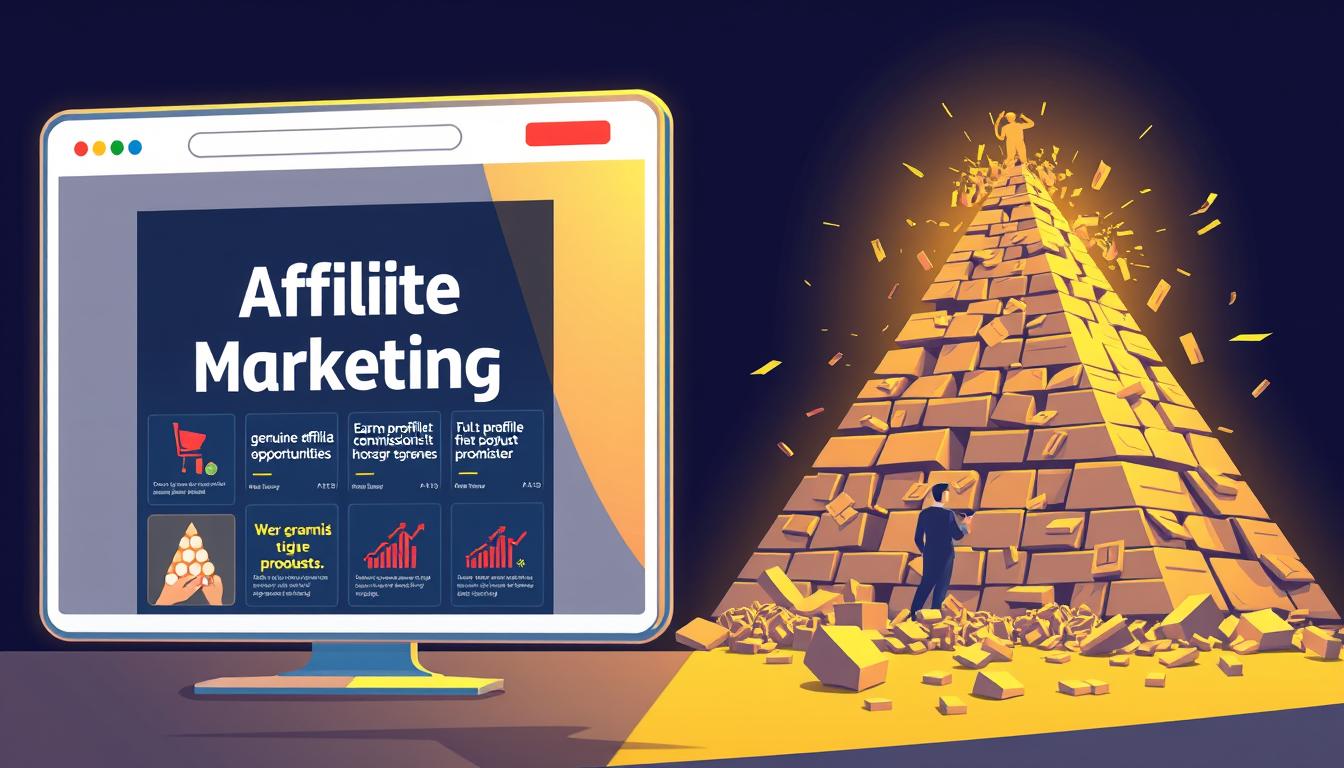The global affiliate marketing industry is worth a whopping $12 billion. Many entrepreneurs see it as a real way to make money online. Big names like Amazon, eBay, and Shopify use it, showing it’s trustworthy.
But, some wonder if affiliate marketing is really legit or just another pyramid scheme. It’s natural to be skeptical. Yet, knowing the difference between these models is key to making smart choices about making money online.
Affiliate marketing is about earning money by promoting other companies’ stuff. It’s different from pyramid schemes, which mainly focus on getting more people to join. In affiliate marketing, the goal is to genuinely help people find good products.
Key Takeaways
- Affiliate marketing is a $12 billion industry with proven legitimacy
- Performance-based marketing differs significantly from pyramid schemes
- Major brands actively use affiliate marketing as a core strategy
- Success depends on product promotion, not recruitment
- Ethical affiliate programs prioritize transparent commission structures
Understanding Affiliate Marketing Fundamentals
Affiliate marketing is a digital marketing strategy. It lets content creators earn commissions by promoting other companies’ products or services. It’s a performance-based model that connects brands with online marketers who drive sales through unique tracking links.

To understand affiliate marketing, we need to see how it works. Creators use their online platforms to recommend products. They earn a percentage of each sale made through their affiliate links.
Commission-Based Marketing Mechanics
So, how does affiliate marketing work? It involves several steps:
- Affiliates select products they want to promote
- Companies provide unique tracking links
- Creators share links across digital platforms
- Commissions are earned for successful conversions
“60% of consumers trust brands that are transparent about marketing partnerships” – Marketing Dive
Affiliate marketing offers a wide range of earning potential. Marketers can earn between 5% to 50% commission per sale. For example, digital marketing expert Adam Cherrington made $453,000 in affiliate commissions in just 60 days.
| Affiliate Earnings Range | Commission Percentage |
|---|---|
| Low-End Industries | 5-10% |
| Mid-Range Industries | 15-30% |
| High-End Digital Products | 40-50% |
For success in affiliate marketing, you need to pick products wisely. You also need to engage with your audience and be open about your promotional relationships.
The Truth About Pyramid Schemes

Pyramid schemes are a dangerous trap that lure people with promises of quick money. In 2022, Americans lost over $11 billion to these scams. It’s vital to know about the risks of multi-level marketing.
A pyramid scheme is a fake business that focuses on getting people to join, not selling real products. The business model is doomed to fail because it can’t keep going without new recruits.
“The Federal Trade Commission warns that pyramid schemes typically involve emotional manipulation and high-pressure recruitment tactics.”
- Recruitment is the primary income source
- Promised earnings are typically exaggerated
- Participants rarely generate sustainable income
- High joining fees are common red flags
Network marketing schemes often look like real business chances. But, 99% of people in Multi-Level Marketing (MLM) schemes lose money. The key difference is that real businesses sell products, while pyramid schemes just recruit more people.
| Pyramid Scheme Characteristics | Legitimate Business Traits |
|---|---|
| Emphasis on recruitment | Focus on product value |
| Unrealistic income promises | Transparent earnings potential |
| High entry fees | Low or no entry barriers |
It’s important to know the difference to avoid getting scammed. Always do your homework on any business opportunity. Be wary of promises of easy, quick money.
Is Affiliate Marketing A Pyramid Scheme?
Online marketing can be tricky to understand, with some options being scams. Affiliate marketing is a real and open way to make money online.

Affiliate marketing and pyramid schemes are very different. Affiliate marketing is a legitimate business model that rewards you for selling real products.
Core Operational Differences
- Affiliate marketing rewards creators for selling real products
- No mandatory recruitment requirements exist
- Compensation directly ties to actual sales generated
Revenue Generation Models
| Affiliate Marketing | Pyramid Scheme |
|---|---|
| Performance-based commissions | Recruitment-driven income |
| Promotes genuine products | Focuses on recruiting new members |
| Transparent earning potential | Unsustainable financial model |
Legal Status Comparison
The law clearly shows affiliate marketing is okay. The Federal Trade Commission (FTC) sees it as a valid marketing way. Many ask, is affiliate marketing legit?
“Affiliate marketing provides a transparent, performance-driven approach to online marketing” – Digital Marketing Expert
Knowing the difference between affiliate marketing and pyramid schemes helps. It lets people safely try this honest and profitable business.
Legitimate Business Model vs Fraudulent Schemes

Affiliate marketing is a clear and honest way to do business. It brings real value to everyone involved. It’s different from fake schemes because it rewards actual results.
The heart of affiliate marketing is fairness and honest promotion. Companies only pay when results are achieved, like sales or leads. This makes marketing open and honest.
“Success in affiliate marketing comes from delivering real value, not from recruitment tactics.”
Here’s what sets affiliate marketing apart from scams:
- It’s based on performance, not just sales.
- There’s no need for big upfront costs.
- It’s all about promoting products.
- There are clear rules for how much you get paid.
Affiliate marketing is also clear about money. You can make 1% to 70% of the sale price. This is different from pyramid schemes that focus on getting more people in.
This model is good because it’s fair and honest. Businesses get more customers, and affiliates make money by promoting things they believe in.
“Integrity is the foundation of successful affiliate marketing.”
In the end, affiliate marketing is good for everyone. It’s about creating value, not tricking people.
How Affiliate Marketing Creates Value
Affiliate marketing is a system where businesses, marketers, and consumers work together. This creates value for everyone involved. With 81% of brands using affiliate marketing, it’s a winning strategy for all.

The strength of affiliate marketing is its focus on results. It’s different from traditional ads because businesses only pay for sales. This makes it a smart way to spend marketing money.
Product Promotion Strategies
Good affiliate marketers use smart strategies to earn more:
- They make high-quality content that includes product suggestions.
- They focus on specific groups that really care about what they’re promoting.
- They use many ways to reach people, like blogs, social media, and email.
- They share their real experiences and honest reviews of products.
Commission Structure Benefits
There are many ways to earn from affiliate marketing:
| Commission Type | Earnings Potential | Example Platforms |
|---|---|---|
| Percentage-Based | 1% – 20% | Amazon Associates |
| Flat Rate | $5 – $100 per sale | Software/Digital Products |
| Recurring Commissions | Monthly Recurring Revenue | SaaS Platforms |
Performance-Based Earnings
Marketers get paid based on their success. They earn by making real sales and adding value to customers. With the market expected to hit $15.7 billion by 2024, the earning potential is huge.
“Success in affiliate marketing isn’t about quick wins, but building trust and delivering genuine value to your audience.”
Common Misconceptions About Affiliate Marketing

Affiliate marketing is filled with myths that might stop people from trying it. It’s important to know these myths if you’re thinking about getting into affiliate marketing.
Here are some common affiliate marketing myths:
- Myth: Affiliate marketing is a get-rich-quick scheme
Reality: Making money through affiliate marketing takes hard work, smart planning, and ongoing effort. Most affiliate marketers make less than $10,000 a year. This shows that quick wealth is not a promise.
- Myth: You need a massive audience to succeed
Actually, even small content creators can make good money. Nano-influencers with 500-10,000 followers are becoming more valuable in affiliate marketing.
- Myth: Affiliate marketing is only for large businesses
Small businesses can really benefit from affiliate marketing. They get more exposure to the right people. The industry is expected to grow 10% every year in 2023.
“40% of online marketers view affiliate marketing as a crucial skill in digital marketing.” – Industry Research
The risks of affiliate marketing are often exaggerated. High-ticket affiliate marketers can make about $80,000 a year. Full-time professionals in the U.S. can earn between $64,000 and $116,000.
Is affiliate marketing worth it? It depends on your dedication, strategy, and willingness to learn. With U.S. spending on affiliate marketing estimated at $13 billion in 2023, there’s a lot of potential for success for those who do it right.
The Role of Recruitment in Both Models
Understanding how recruitment works in affiliate marketing and network marketing shows big differences. These differences help tell real business models from scams. Both methods connect people, but their goals and ways of working are very different.

Pyramid Scheme Recruitment Tactics
Pyramid schemes focus more on getting new people in than selling products. They are known for:
- Emphasis on recruiting multiple levels of participants
- Requiring substantial entry fees
- Generating revenue mainly through recruitment
- Creating a financial model that can’t last
“In pyramid schemes, people make money by bringing in others, not by selling real products or services.”
Affiliate Program Partnership Structure
Affiliate marketing works in a different way. It focuses on making money based on how well you sell products. It’s all about:
- Earning commissions from actual sales
- Being clear about how much you can make
- Helping customers find value
- Tracking how well marketing works
| Aspect | Pyramid Scheme | Affiliate Marketing |
|---|---|---|
| Revenue Source | Recruitment Fees | Product Sales |
| Sustainability | Low | High |
| Legal Status | Illegal | Legal |
The main difference is in how they make money. Affiliate marketing adds real value by promoting products. Pyramid schemes, on the other hand, aim to take money from people without giving much back.
Financial Investment Requirements

Starting affiliate marketing doesn’t need a lot of money, making it great for beginners. Unlike pyramid schemes that cost a lot upfront, real affiliate marketing programs are easy to get into.
“The beauty of affiliate marketing is its accessibility – you can begin with virtually no initial capital,” states digital marketing expert Sarah Reynolds.
Important money matters for affiliate marketing include:
- Domain name registration ($10-$15 annually)
- Web hosting services ($3-$30 monthly)
- Content creation tools
- Optional marketing software
Most affiliate programs, like Amazon Associates or eBay Partner Network, are free to join. The main investment is your time and effort in making good content and attracting readers.
| Investment Type | Estimated Cost | Purpose |
|---|---|---|
| Domain Name | $10-$15/year | Website establishment |
| Web Hosting | $3-$30/month | Website maintenance |
| Marketing Tools | $0-$50/month | Content creation and tracking |
If you’re wondering how to start affiliate marketing with little money, focus on making valuable content. Use free places like social media and blogs. Success comes from smart marketing, connecting with your audience, and always learning.
Sustainability and Long-Term Viability
The affiliate marketing world is growing fast and strong. It’s now worth $12 billion globally. This growth shows that making money online through smart marketing is possible.

Affiliate marketing is a big deal in the economy. It gives people many ways to earn money. Its success comes from a few main things:
- Performance-based pay
- Easy start for newcomers
- Many products to promote
- Big chance to make more money
Market Growth Potential
Recent stats show great news for online business owners. About 80% of companies use affiliate programs. This means the market is getting bigger. There’s a lot of room for growth for those who put in the work.
| Metric | Percentage |
|---|---|
| Digital Media Revenue from Affiliate Marketing | 15% |
| Average ROI for Affiliate Programs | 10-15x |
| Commission Rates per Sale | 5%-50% |
Revenue Sustainability Factors
Affiliate marketing future looks bright. There are many ways to keep making money:
- Offering a variety of products
- Creating content that hits the mark
- Improving SEO
- Keeping in touch with your audience
“Affiliate marketing offers a transparent, performance-driven approach to digital entrepreneurship.” – Industry Expert
By focusing on adding real value and being honest in marketing, affiliate marketers can create lasting income. This way, they can keep up with the changing online world.
Identifying Red Flags in Business Opportunities

Exploring online business needs a sharp eye for scams. The affiliate marketing world is worth $12 billion. Knowing the warning signs is key to keeping your money safe.
Spotting red flags in online business can prevent scams. Here are important signs to watch out for:
- Unusually long response times to communication
- Unrealistic promises of rapid wealth generation
- High-pressure recruitment tactics
- Lack of transparent product information
Pyramid scheme warning signs include certain behaviors. Watch for these red flags:
| Warning Signal | Potential Risk |
|---|---|
| Outlier Conversion Rates | Rates consistently above 40% suggest potential fraud |
| Suspicious Traffic Sources | Traffic from known data centers indicates possible IP fraud |
| Excessive Chargebacks | High chargeback rates months after transaction |
Protect yourself by conducting thorough research and maintaining skepticism toward opportunities that seem too good to be true.
“In the digital marketplace, vigilance is your best defense against fraudulent schemes.” – Cybersecurity Expert
By knowing these warning signs, you can safely explore affiliate marketing. This way, you can avoid scams and stay safe.
Legal Protections and Regulatory Compliance
Affiliate marketing is bound by strict rules to protect consumers and ensure honest ads. It’s vital to grasp these rules to keep marketing honest and avoid legal trouble.

The Federal Trade Commission (FTC) sets clear rules for affiliate marketing. These rules help make sure ads are honest and clear to consumers.
FTC Disclosure Requirements
Affiliate marketers must follow strict rules to avoid misleading ads. The main rules are:
- Clearly stating any financial relationship with promoted products
- Providing transparent information about potential commission earnings
- Ensuring all promotional content reflects honest product experiences
Compliance Strategies
Having strong compliance plans is key for affiliate marketers. It helps them follow the law well.
| Regulatory Aspect | Compliance Action |
|---|---|
| Disclosure | Explicit commission relationship statement |
| Consumer Protection | Accurate product representation |
| Data Privacy | Adherence to CCPA and GDPR guidelines |
“Transparency is not just a legal requirement, it’s a trust-building mechanism with your audience.” – FTC Marketing Guidelines
New privacy laws like VCDPA, CTPA, and CPA are changing affiliate marketing. Marketers need to keep up with these changes to stay compliant and protect their reputation.
Being proactive in following the rules shows professionalism. It also builds trust in the affiliate marketing world.
Success Metrics and Earning Potential
Getting into affiliate marketing means understanding how much you can earn. Top performers know that making money takes strategy and hard work.
“Success in affiliate marketing isn’t about overnight riches, but about building genuine value for your audience.”
The amount you can earn in affiliate marketing changes a lot. It depends on a few important things:
- Conversion rates
- Commission structures
- Audience engagement
- Marketing strategies
Stories of affiliate marketing success show that earnings can vary a lot. Some make a lot of money by using smart ways to promote products.
| Commission Type | Typical Earnings Range | Potential Factors |
|---|---|---|
| Pay-per-sale | 5% – 30% per sale | Product type, industry |
| Pay-per-lead | $1 – $50 per lead | Conversion complexity |
| Pay-per-click | $0.10 – $1 per click | Traffic quality |
To make more money with affiliate marketing, focus on:
- Picking products that convert well
- Building a specific audience
- Creating content that’s valuable
- Building trust with your followers
It’s important to have realistic goals. Most people start small and grow their income over time. They keep working hard and learning new things.
Conclusion
Understanding online marketing is key. Affiliate marketing is a real way to make money, unlike pyramid schemes. It lets you earn by promoting products honestly.
Is affiliate marketing legit? Yes, it is. It’s different because it focuses on real product promotion, not just getting more people in. Only a small percent of pyramid scheme members make money, but affiliate marketing rewards those who do it well.
Good marketing is all about being honest and fair. Affiliate marketing is free to join and pays based on how well you do. This is opposite to pyramid schemes, which often ask for a lot of money upfront. By focusing on real value and trust, affiliate marketers can do well online.
When looking into online marketing, knowing a lot is important. Make sure to check out any program well and choose ones that are fair. Affiliate marketing is full of chances for those who put in the work and care about their marketing.

